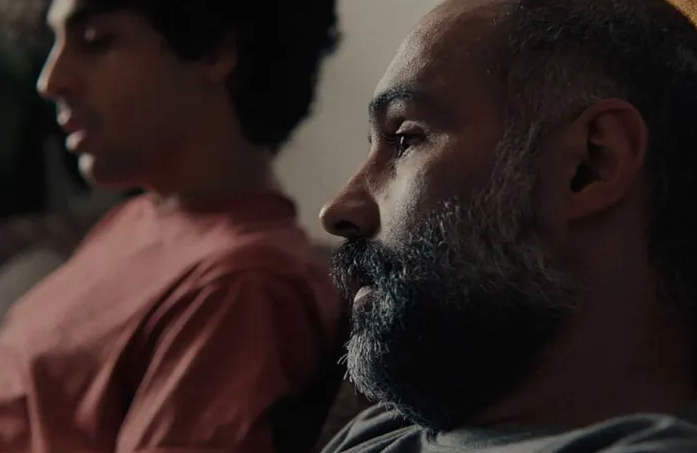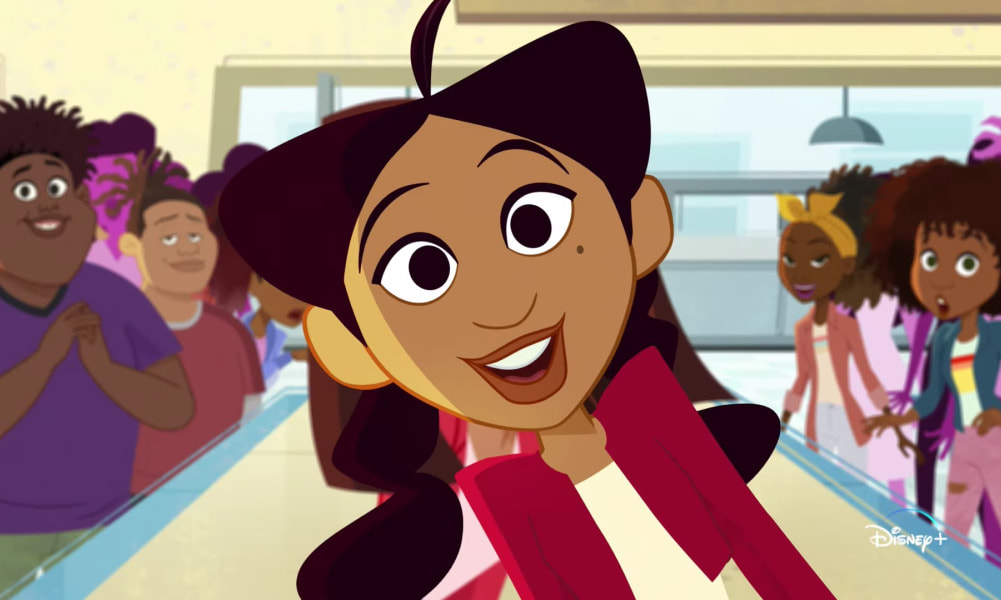|
Maziyar Khatam and Amir Zavosh in “Baba” (2023) Filmmakers Anya Chirkova and Maziyar Khatam are two of the most exciting emerging talents in the industry. From writer-director Chirkova’s summer romance “Flower Boy” (which starred Khatam), to Khatam’s clever Sundance short film “Bump” (which he directed, wrote, and starred in), these 2021 works exemplify clear artistic voices. Through relatable characters and impactful gestures, they tell stories of everyday life. “Flower Boy,” filmed in a dreamy summer haze, captures the hopes and dreams of a teenager figuring out who he is. “Bump,” in broad daylight of a city sidewalk, finds physical humor in the trivial altercation of getting accidentally bumped into. These films are the epitome of short and sweet, which has come to define what one can expect from Chirkova and Khatam. Their new collaboration is a short film called “Baba,” which screened at Sundance earlier this year.
Co-directed by Chirkova and Meran Ismailsoy, “Baba” follows a middle-aged Iranian man (Amir Zavosh) as he desperately tries to keep his apartment. All the while, his relationship with his son (Maziyar Khatam) is unraveling in real time. From the moment these characters are introduced, the parental tension is palpable. The father, behind on his rent, is dodging his son’s attempts at conversation. Not to mention pleas from the landlord (James Choy) as well as an upset neighbor complaining about the noise. The film excels at placing you in the thick of a claustrophobic environment, both on an emotional level and by way of setting. A narrow apartment traps chaotic conversations in its walls. Each character who steps foot in this space is immediately caught up in the chaos. The flow of dialogue and use of setting create an echo chamber, which is a strong reflection of the film’s protagonist — he exists in an environment where he engages only with opinions that reinforce his own. Whether it’s his son or his landlord, no one can really get through to him. “Baba” holds attention on a father’s fall from grace, doing so with such a visceral approach that you feel present not only in the apartment, but in his frame of mind. Maziyar Khatam’s screenplay evokes a human experience in a way that feels effortless. The dialogue shines a light on the hurdles of communication barriers and the heartache of isolating from one’s surroundings. Amir Zavosh’s character is so deeply wrapped up in his personal scenarios, everyone else who steps foot into the apartment at some point becomes background noise to his centrality as a protagonist. It is also through the supporting characters that you get a glimpse into the protagonist’s relationships, such as that with his son. Amir Zavosh and Maziyar Khatam, who share wonderful chemistry with each other, bring a grounded quality to the story. You feel immediately drawn to the realism of their characters as they navigate one anxiety-ridden scenario after another. In feeling like a fly on the wall of their experiences, Zavosh’s character especially, the ending is made all the more reverberating as a stunning moment of self-reflection. From the frenetic handheld camera work and overlapping tense dialogue to the claustrophobic setting, “Baba” unfolds mostly in a state of disorder. The direction by Chirkova and Ismailsoy finds strength in beginning the story at a place where tension has already risen and you find yourself in the thick of it. Given the tensity, it is an unexpected surprise how “Baba” ends with such peacefulness. The film’s strong use of a close-up stresses a poignant moment for the protagonist; it’s a well-earned window to his emotional vulnerability, which Zavosh plays very well. Aligned with the direction and screenplay, the acting showcases strong commitment to making a day-in-the-life story feel as realistic as possible.
0 Comments
A still from "The Proud Family: Louder and Prouder" (2023) The 2000s era of Disney Channel animated programming introduced one of the most original and enjoyable shows with “The Proud Family,” created by Bruce W. Smith. The show followed the life of Penny Proud (voiced by Kyla Pratt), a 14-year-old Black girl navigating teen-dom alongside her best friends, loving parents, and entertaining grandma. “The Proud Family” had a resonating, intelligent approach to societal topics, universal themes, Black history and representation. Through loud and proud characters, the show struck a chord with generations and carries a nostalgic power in retrospect. Such was the foundation for the Disney+ revival series “Louder and Prouder,” which lives up to its title and proudly brings the family back to audiences seventeen years later. From creators Bruce W. Smith and Ralph Farquhar, season one encompassed what made the original so charming, and incorporated greater relevancy for a new generation. Season two comes a year later, and continues to highlight the ground breaking quality of “The Proud Family.” “Louder and Prouder” season two continues to explore terrifically written characters, thoughtful representation, and layered storylines.
Season two picks up directly from where the season one finale (“Old Towne Road Part 1”) ends, when Suga Mama (Jo Marie Payton) walks away from the Towne Ranch after once again experiencing sexism from her father. The emotional resonance could have benefited even more without this episodic split, which seems to be a recurring trend across television. Nonetheless, the episode overall brings strong closure to Suga Mama’s relationship with her father, and starts off season two with a narrative refresh. “Louder and Prouder” continues exploring the offbeat adventures of Penny and her family: including parents Oscar (Tommy Davidson) and Trudy (Paula Jai Parker), twin siblings BeBe (Aiden Dodson) and CeCe (Bresha Webb), plus friends such as Dijonay Jones (Karen Malina White) and LaCienega Boulevardez (Alisa Reyes). Within the first few episodes alone, the direction and writing set the tone for what’s to come: another energetic season that balances slapstick comedy with mature commentary and memorable characters. To its credit, the show has always been able to maintain this wonderful stability, while also being sincere and intently observational of societal constructs. The storylines cover extensive topics from social media influence and interracial dating to the history of Juneteenth, as well as perspectives from the LGBTQ community and individuals on the autism spectrum. Much of the strength around how this material is presented rests on the intelligent writing, which does not talk down to a young audience. Instead viewers get an open hearted approach and a lesson on engaging in social commentary. Adding to the energy of “Louder and Prouder” is the brilliant voice acting and the insightful character work. All the humor, excitement, and poignancy of the show comes through. Kyla Pratt returns with her iconic performance as Penny. Just as iconic, Jo Marie Payton as Suga Mama and Tommy Davidson as Oscar bring the characters to life with astounding vocal range. The characters are given mostly entertaining, clever scenarios and fun physical comedy. While some episodes feel a little more repetitive and simplistic than others, the overall focus is consistent with telling a modern story about a dynamic group of characters. Season two also keeps up with the energy of season one, which landed on clever jokes without losing the point of a narrative message or a particular character arc. The storylines are more resonating, the topics more expansive, and the animation design vibrant than ever. Each character is given a distinctive expression and personality. The revival of “The Proud Family” reminds audiences, whether returning fans or brand new ones, that animation is one of the most powerful styles of storytelling. Through a charming family, louder and prouder than ever, the series continues to bring universal themes to the hearts of all ages. “The Proud Family: Louder and Prouder” season 2 is now available on Disney+. |
Archives
June 2024
Categories |



 RSS Feed
RSS Feed